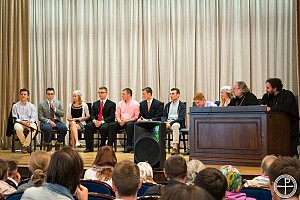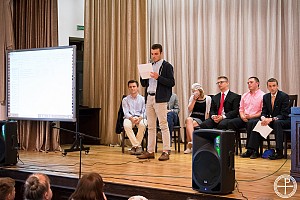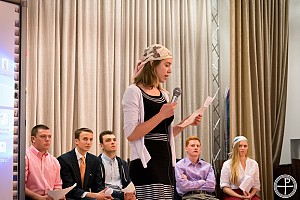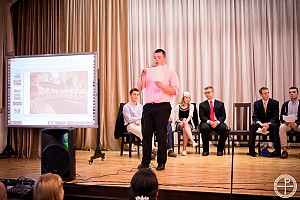During the spring, a great relic was brought from the Synodal Cathedral of the Sign in New York City to St. Elizabeth Convent in Minsk, Belarus: a reliquary with the right arm of the Holy Nun-Martyr Grand Duchess Elizabeth Feodorovna, and a piece of the relics of Nun-Martyr Barbara. The reliquary was transported from New York by the Vice President of the Synodal Youth Department of the Russian Orthodox Church Outside of Russia, Archpriest Andrei Sommer. Around 16,000 people venerated the relics.
Orthodox youth arrived with the cleric to the Belorussian capital. Practically all of the young people were descendants of Russian émigrés of the First and Second Waves. The First Wave chronologically correlates to the years of 1917-1940, when soldiers, intelligentsia, clergymen, and the nobility were forced to flee from Soviet authorities, who had been victorious in the Revolution and Civil War. The majority of émigrés from the Second Wave (1941-1960) were driven from the homeland by the Second World War and increasingly ruthless repression.
In the words of the American guests, the most memorable event of the springtide trip became the visiting of a foster home for children in Novinki (Minsk) and meeting with Belorussian youth, where their brothers in the Faith from the Russian Orthodox Church Outside of Russia shared their upbringing in Russian traditions. Many of them speak Russian fairly well, being that they attended Russian school, where they learned the history, culture, literature, and music of their historic homeland. I can particularly recall the tale of a certain girl. When she and her brother began speaking American [sic], the voice of their mother suddenly came from the neighboring room: "Who’s speaking a foreign language in my house?"
Questions came flooding in one after another in the hall, to which the guests answered very honestly and emotionally. And, in the end, the American youth sang the song "Borodino," clearly and harmoniously performing it a capella. Many of us did not even remember the words of this famous poem, let alone were we able to sing it…
Our friends recently sent along their impressions on the trip. Today, we share their opinions of our monastery, our country, and its people.
Our friends recently sent along their impressions on the trip. Today, we share their opinions of our monastery, our country, and its people.
Alexei Ohotin: The youth trip to St Elizabeth Convent under the guidance of Fr. Andrei Sommer was centered around an important cause. We brought the relics of the Holy Grand Duchess Elizabeth, visited foster homes in order to lend assistance from American parishes, and also met with Belorussians and openly spoke of our shared Faith.
A meeting of Orthodox youth was held at the Minsk Theological Academy. We spoke before hundreds of young Belorussian men and women on the topic of the life of Russian Orthodox Christians in America. We first spoke about ourselves, and then answered questions for over two hours. People asked how we were able to grow up Orthodox in secular society, what we had read in Russian, and how we engage with our non-Orthodox contemporaries in the USA. They were all very interested in how the youth in America can lead a traditional Orthodox life. We tried with all our might to honestly and openly answer, and after the symposium, the Belorussians surrounded us and posed even more questions! Two Belorussian girls even shared that, beforehand, they looked negatively upon American culture, but were truly touched by our fervent Orthodox way of life.
During the trip to Belarus, we stopped at St. Elizabeth Convent. I can truly say that I have never met more hospitable people. We conversed with the nuns and clergymen of the monastery on our life in America, on life in the monastery, and in Belarus. In only three days, thousands of people from all corners of the country visited the monastery in order to venerate the relics of St. Elizabeth. Pilgrims were arriving throughout the day and into the late hours of the night. We were all astounded by the number of people who came to venerate the relics.
The benevolent goal of our journey to Minsk was the transfer of monetary aid to the foster home for children with disabilities, which is under the patronage of St Elizabeth Convent. These funds were gathered in Orthodox parishes all over America thanks to the "School Piggybank" program. Hundreds of American children donated their pocket change toward the construction of a sensory garden for the foster home – the first in Belarus. We visited this setting on Monday and were even present for a musical presentation! The foster home children, together with volunteers from the Belarusian State Academy of Music, sang and danced for us. After this, we spoke with the volunteers.
The trip became a real blessing for all of us, and we eagerly await the next availability to travel abroad in the name of Orthodoxy.
Alexander Boldewskul: The convent welcomed us very hospitably. I had not been to Russia in a while, and although Belarus is considered a separate country, many of the same aspects of Russian culture are present here: the Orthodox Faith, mentality, and general atmosphere. What I saw left a good impression upon me.
The church services were beautiful, and the choir at St. Elizabeth Convent is magnificent. On the first day, we attended the evening service at Holy Spirit Cathedral and, our jetlag notwithstanding, I received great joy from participating in the divine services in a country that is closely tied to Russia, wherefrom ROCOR has its roots. This was a fascinating spiritual experience.
I will also never forget visiting the foster home for children with disabilities and the home for seniors. When our group was invited to attend a concert performed by the foster home children, I almost wept. We also put on similar events back home in Boston.
All in all, we had a wonderful pilgrimage. Everything went off remarkably. The trip strengthened my Russian Orthodox identity.
Elena Ivanov: In May of this year, a group of Orthodox youth from the East Coast of the USA arrived in Minsk with the relics of St. Elizabeth. I was fortunate enough to be part of this group. We lived at St. Elizabeth Convent, where we saw how much St. Elizabeth means not only to the monastics, but to Belorussians overall. During the five-day stay, we saw people from various corners of the country, having spent many hours on the road, and afterwards, more time standing in line for the relics. Akathists, molebens, and troparia sounded day and night. This trip invigorated me for further participation in pilgrimages abroad in order to see how God unites people in the Church.
Seraphim Arlievsky: I gained a lot thanks to the trip to Minsk, the most noticeable being interaction with Orthodox youth. Our diaspora is removed from the country which we call our homeland, and among our youth, the Russian language and Russian culture are slowly dying out. It is critically necessary for us to uphold ties with the Russian Orthodox world in order to preserve the traditions. It is also important for clergymen to uphold these ties, but the youth: that is the future, and creating bonds between youth people is the foundation of our future.
A visit to St. Elizabeth Convent brings great spiritual benefit to anyone who comes here. Essentially, in America, there probably are not any Orthodox organizations of this magnitude. When you visit a place where Orthodoxy prevails and, principally, the approach to the Church differs from ours, you begin to look at many things differently, especially inasmuch as Orthodoxy is itself a minority in America.
Travelling the world is extremely beneficial in and of itself. When you observe how people live in other countries, how much the quality of life, traditions, and social norms differ, all of it widens your personal horizons.
Michael Mackanic: I can say that the trip to Minsk has undoubtedly become the most interesting in my life and once of the best impressions that I have gained. Thanks to the journey to the capital of Belarus, my knowledge and understanding of the world has substantially expanded. It is one thing to know that a world exists beyond the borders of the USA, but another is to give this understanding a whole new dimension, having spent time here and having met with the people. It was interesting to see Minsk and its surroundings, but namely the interaction with Belorussians about Orthodoxy and culture is what made this trip memorable. Unfortunately, during the first few days, it was difficult to get accustomed to and fully take part in the divine services and other events. However, I am glad that in this short period of time we were able to fit so much in.
Boris Belikow: We were greeted unbelievably warmly on the train. Everyone that I met was full of joy and took great interest in how we came to be in Minsk. And, for me, it was interesting to see how the people of Belarus live and what they think about. Seeing as how a church would be nearby no matter where you happened to be, it was easy to understand that God plays in important part in the lives of Belorussians, just as for us in ROCOR. Taking into account the support of the government and the entire population, you stop being surprised at how churches in Belarus are filled not only every Sunday, but on every other day. In the USA, I have not even seen Catholics with so many parishioners.
Masha Healy: I was afforded a wonderful opportunity to come to Minsk, accompanying the relics of the Holy Martyrs Elizabeth and Barbara. The denizens of Minsk who greeted the relics of these saints with such reverence and prayer invigorated me. I go to the cathedral in New York and often pray next to the relics. This seemed like normal fare to me, but now, after returning, I will cherish the opportunity to pray at the relics every day I can. We met with the youth of Minsk and told of life for Orthodox Christians in America. The time I spent with the sisters of the convent is also precious to me. I was given the opportunity to speak with them myself and receive answers to my concerns. I am very thankful for such unique insight. Although the trip was quite short, it will have a permanent effect on my entire life.
Kyril Kavetsky: A moleben was immediately served before the reliquary with the arm of St. Elizabeth right after landing in the Minsk Airport, and the magnification followed the relics during their entire journey through Minsk. In Holy Spirit Cathedral as well as St. Elizabeth Convent, we saw thousands of people who came from afar in order to greet the reliquary with the arm of St. Elizabeth. For us, the American youth, it was not only a spiritually invigorating display, but also an important reminder of those blessings which are found in our own churches.
During the journey, we participated in church services, and it was joyful to see how little the churches in America and Belarus differ. We felt at home in the churches. Wonderful choirs sang during the length divine services: professional choirs in the cathedral and a remarkable monastic choir in the convent. We were overjoyed to observe their devotion to the Lord through singing.
During the journey, we met often with Belorussians, visiting the foster home, dining with the clergymen and Church officials, meeting with the youth and discussing the life of the Russian Orthodox Church…
Minsk accepted the holy relics with joy, and us as well. It was difficult to leave. We will never forget our trip to this russophone Orthodox country.
Tatiana Zakharova: This year, I was given the opportunity to visit Minsk with nine other peers. When we exited the plane, I was very surprised at how many people gathered to greet the relics of St. Elizabeth. It was a little strange to observe how important it was for the gathered people, as we live so close to the relics of the saints and do not think about what a treasure we possess.
I remember the discussion with the Belorussian youth and the visit to the foster home most from the trip. At first I thought that we will be speaking before 15-20 people, and was therefore shocked when I saw the hall packed with people. Many questions from the audience required us to think of the future, for example: "How are you planning to raise children?" and "Do you want to move to Russia at some point?". It was amazing to see the people’s interest in our Orthodox life in a country which has dispensed with many traditional values. It was very difficult for me to visit the foster home and see children who are totally dependent on help from other people. It was as if I was on another planet. I respect those who work in the foster home and dedicate their lives to these children. It was great to see how, thanks to the "School Piggybank" program created by the St. Prince Vladimir Youth Association, we were able to provide them aid.
Visiting the multitude of churches and divine services, interacting and exchanging experiences – owing to all these experiences, it was difficult to leave, and there was a desire to hold on just a little longer. I still remember this trip with great joy!
Prepared by Maria Kotova
www.obitel-minsk.ru
Translation by the Eastern American Diocesan Media Office





